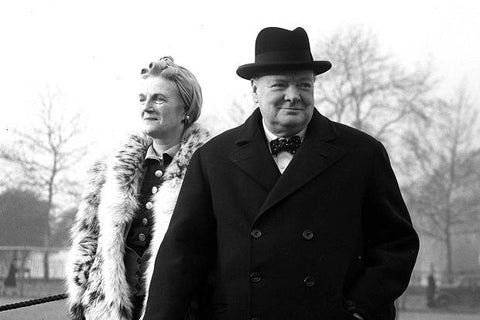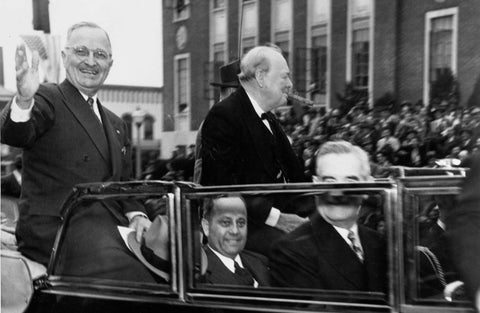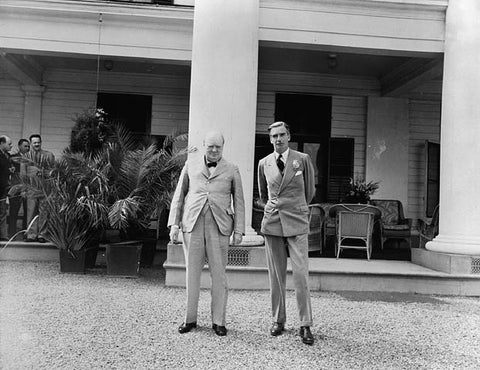Winston Churchill was an inspirational statesman, writer, orator and leader who led Britain to victory in the Second World War. Considered to be one of the greatest leaders of the 20th Century, this is an in depth coverage of his life, achievements and failures.
Childhood
On 30 November 1874, Churchill was born at his family's ancestral home in Blenheim Palace, Oxfordshire. Here is where he spent most of his childhood, both before he went to school and during the school holidays.
In fact, Blenheim Palace remained one of Churchill’s favorite places and where years later, he proposed to his wife, Clementine.
From the age of eight, Winston spent most of his days away in boarding schools in Ascot, Brighton, and finally Harrow School, a boarding school for boys.
Throughout his childhood, he wasn’t close to his parents and saw very little of them. Instead, Churchill and his younger brother, Jack, were brought up by his nanny, Mrs. Everest. Young Winston was extremely fond of Mrs. Everest, and he was devastated when she died when he was twenty-one years old.
In fact, a letter from the assistant master sent to Churchill’s mother, Lady Randolph, in July 1888 detailed many of his academic shortcomings, including forgetfulness, carelessness, and a lack of punctuality.

But despite this, he possessed a remarkable ability to memories lines(something that served him greatly later in life during his monumental public speeches). He entered a school competition and won a prize for reciting from memory 1,200 lines from Macaulay’s long poem, Lays of Ancient Rome.
Life as a Soldier
He had a collection of some fifteen hundred Napoleonic era toy soldiers, which he marshaled in mock battle. From a young age, it was evident he had a deep interest in the military. In fact, weeks after joining Harrow, he joined the Harrow Rifle Corps.
In 1892, he completed his education in Harrow, but his parents had already concluded that he wasn’t clever enough to apply to Cambridge or Oxford. Instead, his father instructed him to apply to join the military and Winston readily accepted.
At first, it didn't seem the military was a good choice for Churchill. His first two attempts resulted in failure. He left Harrow in December 1892 to study for a third attempt in London with Captain Walter James of the Royal Engineers, whose profession was to prepare young men for the Sandhurst exam.
Only on the third trial did he manage to pass the exam for the British Royal Military College. He soon found the military college much more suited to him and graduated two years later, twentieth out of a class of one hundred and thirty.

As a soldier, Winston was eager to be posted to ‘where the action was’. He initially had his eyes set on either Egypt or South Africa, but things didn’t go his way. He ended up being posted to India in the Autumn of 1896. However, the uneventful daily military routine in Bangalore soon bored him.
He soon landed a contract as a war correspondent for the Daily Telegraph in the colonial British North West frontier(modern-day Pakistan). This was one of the many examples of the love of adventure which marked Churchill all his life. He was a man who was definitely not afraid of the battlefield.
His time here later became the subject of his first book, The Story of the Malakand Field Force, published in March 1898. There he wrote, “Bullets are not worth considering… I do not believe the Gods would create so potent a being as myself for so prosaic an ending.” This portrayed Winston for who he truly was— an extremely ambitious man who didn’t leave any room for fear or self-doubt.
Life After the Army
In 1899, Churchill left the Army and worked as a war correspondent for the Morning Post. The contract he negotiated with the newspaper made him the highest-paid war correspondent of the day(a salary of £250 a month plus all expenses).
This is because Churchill was an excellent reporter and understood history, so his analysis was considered insightful and brilliant. While reporting on the Boer War in South Africa, he was taken prisoner by the Boers during a reconnaissance mission in an armored military train.
Two weeks later, while the guards weren’t watching, Churchill scaled the prison fence in the dead of night, made a break for freedom, and safely navigate the 300-mile journey through enemy territory to reach Portuguese East Africa (now Mozambique).
Soon after his daring escape made headlines, and upon his return to Britain, he wrote about his experiences in the book London to Ladysmith via Pretoria (1900). Winston leveraged his newfound celebrity status to launch his political career.

Churchill Becomes A Military Hero
Churchill had grown tired of the dull soldier’s life in India. He craved for real action. So in 1899, he decided to quit the army and jump into politics —just like his forefathers before him.
However, his political bid didn't start off well, and he lost his bid for the Conservative seat of Oldham by a narrow margin. Soon after he landed a job as the war correspondent for the Daily Post and was sent off to South Africa to report on the war there. Here too, things didn’t go according to plan, and he soon found himself in the crossfire.
Not a month into his new job, he got captured and taken prisoner by the Boers. Luckily, less than a month later, he escaped. Stories of his daring escape spread like wildfire back in Britain, and he returned to his home country a bonafide hero. And what better way to leverage his newfound fame than jump right back into politics.
Winston Launches His Political Career (Again)
Churchill laid siege again to Oldham in the election of 1900. This time managing to secure victory by a margin as narrow as that of his previous failure. But all that counted was that he was in! Backed by the good income, he was making from his writing; the future looked bright.
Winston wasn’t one to shy away from expressing his strong opinions and acting on them. This got him on the wrong side of his superiors, and by 1904 he had fallen out of favor with the Conservative Party.
At this point, he decided to join the Liberal Party and run for the Manchester North West seat in 1906. He won this seat and joined the new government as the undersecretary of state for the Colonial Office. Here he helped oversee the affairs of the British Empire’s numerous colonies.
In 1908 at the age of 33, he was appointed the President of the Board of Trade, making him the youngest Cabinet member since 1866.

Credit: International Churchill Society
Churchill Gets Married
Clementine Hozier faced a lot of hardship throughout her childhood, but despite this, she matured into a stunningly beautiful young woman full of intellectual prowess, resolve, and fortitude. Just like Winston, she yearned for a life of excitement.
As a result, she rejected one suitor after the other, terming them as boring. In one of those occurrences ordained by fate, Winston and Clementine found themselves sitting next to each other at a dinner party—one which neither wanted to attend in the first place. They soon found themselves engaged in a hearty and animated conversation.
This marked the start of their love affair. They were both in search of comfort as well as excitement; both had endured hardships and heartache. Six months later, they got married at St Margaret’s Church, Westminster, on September 12, 1908.
The couple’s marriage lasted for a good 57 years and only came to an end on Winston’s passing away in 1965.

Churchill's Fall From Power
At the outbreak of war in 1914, Churchill was serving as First Lord of the Admiralty. Sadly, most of his efforts on the battlefield resulted in disastrous defeats. One of his worst defeats was during the Dardanelles campaign.
In March 1915, during World War I, British and French allied forces launched an ill-fated naval attack on Turkish forces in the Dardanelles (Northwestern Turkey) hoping to take control of the strategically vital strait separating Europe from Asia.
This campaign, together with the Gallipoli Campaign—a year later—failed terribly. The result was approximately 205,000 British soldiers and 47,000 French servicemen died on the battlefield (plus 250,000 Turkish casualties). Churchill took a severe blow to his reputation since he had aggressively pushed for these two war strategies.
He came under heavy political attack and was demoted from his Admiralty position. Soon after, he resigned from the government and returned to active service in the military.

Churchill In the Shadows
In 1919, shortly after the end of the war, he was appointed Secretary of State for Air and War. In this role, he attended the 1919 peace talks in Paris where he took part in discussions about the state of the post-war world.
In 1922, Churchill hit one of his lowest moments. The electorate in Dundee was no longer happy with their representative. On top of that, shortly before the elections, he was gripped by a sudden attack of appendicitis.
This immensely limited his campaigning, resulting in a humiliating loss. For the next two years, he was out of Parliament.
Later as he reflected on that season in his life, he wrote, “I found myself without an office, without a seat, without a party, and without an appendix.”
The following 15 years were spent in and out of the government. In fact, he spent most of the 1930s warning the government of Hitler and Germany’s aggressive expansion, never being really accepted or heard by the powers that be.

Churchill Becomes a World Statesman
Toward the end of World War II, the coalition government dissolved. Churchill's desire was for the wartime coalition to remain intact until Japan was defeated. However, all the parties wanted an early election.
This forced Churchill to undertake a political campaign in the middle of a battle against Japan. Though he managed to retain his parliament seat, he saw his party reduced to 213 seats in a Parliament of 640. Records show that he learned that the electorate had kicked him out of office in the middle of the final wartime conference in Potsdam, Germany.
A plausible explanation for his loss was his misplaced focus. While his pitch mainly focussed on war efforts, the people were now more concerned about economic and social reforms. After his defeat, his wife Clementine told him, "It may well be a blessing in disguise." Churchill replied, "At the moment, it seems quite effectively disguised."

Iron Curtain Speech
Though he had emerged victorious in World War 2, he had one growing concern—the Soviet Union (his allies in the war victory) had begun exerting an immense influence over the whole of Eastern Europe.
Out of office and transitioning to a world statesman, the former prime minister saw an invite by US President Harry Truman as the ideal opportunity to launch his foreign policy agenda against the growing Soviet Union.
On March 5, 1946, while on the podium of Westminster College, Churchill delivered his famed Iron Curtain Speech. “From Stettin in the Baltic to Trieste in the Adriatic, an iron curtain has descended across the continent,” he warned as he articulated the threat that the Soviet Union and communism posed to peace and stability in the post-war world.
The Iron Curtain Churchill referenced was the political, military, and ideological barrier that divided Europe into two separate areas from the end of World War II in 1945 until the end of the Cold War in 1991. The term symbolized efforts by the Soviet Union to block itself and its satellite states from open contact with the West and non-Soviet-controlled regions.
Churchill's proposal to this imminent threat was the establishment of a ‘special relationship’ between the United States and the British Commonwealth as a counterforce to Soviet growing influence. This speech is regarded as one of the founding pillars of the Cold War.

The Second World War Memoirs
In the late 1940s, Churchill refocused on his writing career. During those years out of office, he published six volumes of his World War II memoirs. The series shed light on his personal thoughts, beliefs, and experiences of the Second World War.
The books were well received and quickly became best-sellers in both the UK and US. This worked out well for him since throughout his lifetime, writing often was his main source of income. In fact, from the memoirs, he earned double what he did as a Prime Minister.

Becoming Prime Minister Again
During his time out of office, Churchill also became the leader of the Conservative opposition party. In the 1951 general elections, the Conservatives returned to power with a narrow majority, and Churchill became prime minister for the second time at the age of 77.
Undoubtedly, Churchill was getting older, and it’s no surprise he reserved his energy and attention for what he regarded as the supreme issues, global peace and putting restrictions on the Soviet Union’s ever-increasing power.
In fact, housing was Churchill's only real domestic concern, and to his luck, his Minister of Housing and Local Government appointee, Harold Macmillan, was able to meet his target of building 300,000 new houses per annum.
Sadly, in 1953 Winston suffered a serious stroke and had to take four months off most of his duties to recuperate. During this time, the parliament and the public were kept in the dark. The reason they were given to explain Winston's absence- the prime minister, was exhausted and just needed to rest. As time went by, his health only declined, but he resisted urges from the political circles for his resignation.
But soon, Churchill could no longer ignore his declining health, and in April 1955, he resigned as Britain’s prime minister. He was succeeded in office by Anthony Eden, the foreign secretary and his political protege.

Life After Retirement
Having served his nation for more than 50 years, Winston was well deserving of a long-overdue break from active politics. Though he still vied for and successfully retained his parliamentary seat for one final term during the 1959 elections, he rarely attended parliamentary sittings and only occasionally participated in the voting.
Straight after retirement, he embarked on holidays, painting tours and new writing projects such as publishing a new book, History of the English Speaking Peoples.
Winston Churchill passed away in January 1965 and was given a state funeral. It was the first state funeral of a politician in the 20th century and the biggest national event since the Queen Elizabeth Coronation in 1953.

Credit:Getty Images
Churchill’s Accolades
In his later years, Churchill received multiple distinguished awards that marked the great things he had accomplished.
In 1953, Queen Elizabeth made Winston Churchill a knight of the Order of the Garter shortly after her coronation the same year, and they enjoyed a close friendship in the years that followed.
In I953, he was also awarded the Nobel Prize for Literature "for his mastery of historical and biographical description as well as for brilliant oratory in defending exalted human values".
In 1963, US President John F. Kennedy proclaimed him an Honorary Citizen of the United States.
In 1965, Winston Churchill Memorial Trust was established in the United Kingdom and Australia. A Churchill Trust Memorial Day was held in Australia the same year, raising $4.3 million. Since that time, the Churchill Trust in Australia has supported over 3,000 scholarship recipients.

Leave a comment